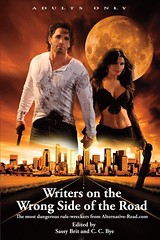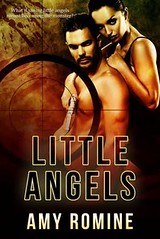Along with being an avid
reader, I am also a huge fan of movies and television. In fact, television
spurred my creative writing juices at an early age. From playing pretend to
writing scripts, I was a fanfiction writer before I knew what fanfiction was. I
admit it, yes, I cut my teeth on fanfiction, and I will say that I am very
proud of my fanfiction writing. One of the biggest things I learned from visual
media is the art of dialog. Simple conversation and the interaction of
characters are pivotal in any story. Many writers have done the exercise of
writing a story with just dialog. A few months ago, I challenged you to write
without dialog. Now I challenge you to try and write without a visual cue, just
two people having a conversation.
Dialog is an art in itself.
The theatre has embraced the idea of conversation. For example, the play “Waiting
for Godot” by Samuel Beckett. Here is an example of artful dialog.
ESTRAGON:
(giving up again). Nothing to be done.
VLADIMIR:
(advancing with short, stiff strides, legs
wide apart). I'm beginning to come round to that opinion. All my life I've
tried to put it from me, saying Vladimir, be reasonable, you haven't yet tried
everything. And I resumed the struggle. (He broods, musing on the struggle.
Turning to Estragon.) So there you are again.
ESTRAGON:
Am I?
VLADIMIR:
I'm glad to see you back. I thought you
were gone forever.
ESTRAGON:
Me too.
VLADIMIR:
Together again at last! We'll have to
celebrate this. But how? (He reflects.) Get up till I embrace you.
ESTRAGON:
(irritably). Not now, not now.
VLADIMIR:
(hurt, coldly). May one inquire where His
Highness spent the night?
ESTRAGON:
In a ditch.
VLADIMIR:
(admiringly). A ditch! Where?
ESTRAGON:
(without gesture). Over there.
VLADIMIR:
And they didn't beat you?
ESTRAGON:
Beat me? Certainly they beat me.
VLADIMIR:
The same lot as usual?
ESTRAGON:
The same? I don't know.
VLADIMIR:
When I think of it . . . all these years .
. . but for me . . . where would you be . . . (Decisively.) You'd be nothing
more than a little heap of bones at the present minute, no doubt about it.
ESTRAGON:
And what of it?
VLADIMIR:
(gloomily). It's too much for one man.
(Pause. Cheerfully.) On the other hand what's the good of losing heart now,
that's what I say. We should have thought of it a million years ago, in the
nineties.
ESTRAGON:
Ah stop blathering and help me off with
this bloody thing.
VLADIMIR:
Hand in hand from the top of the Eiffel
Tower, among the first. We were respectable in those days. Now it's too late.
They wouldn't even let us up. (Estragon tears at his boot.) What are you doing?
ESTRAGON:
Taking off my boot. Did that never happen
to you?
VLADIMIR:
Boots must be taken off every day, I'm
tired telling you that. Why don't you listen to me?
ESTRAGON:
(feebly). Help me!
VLADIMIR:
It hurts?
ESTRAGON:
(angrily). Hurts! He wants to know if it
hurts!
VLADIMIR:
(angrily). No one ever suffers but you. I
don't count. I'd like to hear what you'd say if you had what I have.
ESTRAGON:
It hurts?
VLADIMIR:
(angrily). Hurts! He wants to know if it
hurts!
ESTRAGON:
(pointing). You might button it all the
same.
VLADIMIR:
(stooping). True. (He buttons his fly.)
Never neglect the little things of life.
Read more here…
With the exception of some
action cues, the conversation tells the story, and it is real dialog. It is
easy, fluid, and sporadic. People are not textbook. They are unfocused,
flighty, prone to babbling, and random. Even with the characteristic human
flaws, we are still able to covey ourselves, our ideas, and our environment by
the words we speak. If you have ever attempted to write a script, it is much
more difficult than it seems. A script, as compared to novel, does not have the
luxury of inner thought, unless of course you are Hunter S. Thompson. It is a
visual medium, so the tactile immersion of words is missing. All the author has
is dialog to convey the feeling of surroundings, emotions, and conflict. Your
objection-- you have the visual medium to enhance the story where in books you
only have the description.
So let’s address this shall
we. If you think about it, what movies and or television shows stay with us the
longest? The ones with the story. Which ones get quoted the most often? The ones
with the best dialog of course! Don’t believe me? Here are some examples.
1.
"Frankly, my dear, I don't give a damn." (Clark Gable (as Rhett
Butler), in Gone With the Wind (1939))
2.
"I'm gonna make him an offer he can't refuse." (Marlon Brando (as Don
Vito Corleone), in The Godfather (1972))
3.
"You don't understand! I could've had class. I could've been a contender.
I could've been somebody, instead of a bum, which is what I am."
(Marlon
Brando (as Terry Malloy), in On The Waterfront (1954))
4.
"Toto, I've a feeling we're not in Kansas anymore." (Judy Garland (as
Dorothy Gale), in The Wizard of Oz (1939))
5.
"Here's looking at you, kid." (Humphrey Bogart (as Rick Blaine), in
Casablanca (1942))
So now that we have addressed
the importance of dialog, how do you master it? You listen. Listen to
everything. Pay attention to the way people talk in real life, on television, and
in movies. Consciously think about the dialog as it is happening, and write it
out in your head. A great way to practice is to turn on your favorite show or
movie and write out a scene of the dialog as it is happening. Watch how the
intent of the scene comes across via the dialog. Play around, see what happens, and always be
open to something new!
###
۞۞۞۞GIVEAWAYS۞۞۞۞
*All giveaways are open to all WORLDWIDE unless otherwise stated.
Join our chat over at the Yahoo Chat and Promo group! (and claim your free e-books!) No promos allowed on Mondays-Fridays unless you are an affiliate author.
Word to the Wise
![Word to the Wise]() Reviewed by Amy J Romine
on
8:00 am
Rating:
Reviewed by Amy J Romine
on
8:00 am
Rating:














Great article, Amy! #Thanks @AmyJRomine
ReplyDelete